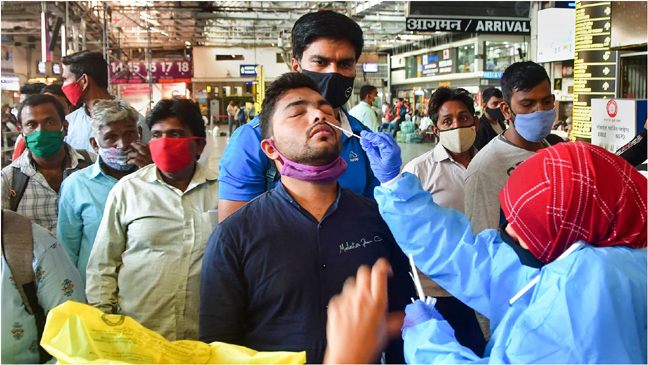
While people bid adieu to the ‘unlucky 2020’ that was touted to be the cursed and worst year in many decades, and ushered in 2021 with hopes of normalcy, the year proved to be even deadlier and unluckier in terms of mortality and the spread of Covid-19 as India battled a fierce second wave. As vaccination drives across the world threatened the survival of Covid-19, the virus adapted itself to the changing times and created an all-new variant Omicron against which the existing vaccines may possibly be less effective.
As the year draws to a close, let’s look back at the journey of Covid-19 in 2021 and how it impacted our lives.
How Delta dashed hopes and caused an intense second wave?
2021 started on a hopeful note as people’s prayers for a Covid-19 vaccine were answered. In March, vaccination for people above 60 years of age and those over 45 with comorbidities kicked off.
While the vaccination drive promised to put our Coronavirus worries to rest, the Delta variant giving us no time to think caused the unprecedented second wave in April-May 2021 which made our health infrastructure crumble.
A virologist says that the second wave acquired the ferocious nature because of the higher transmissibility of the virus and the fact that most of the younger people (18+ group) were not vaccinated at the time.
Delta variant caused a lot of damage to life and a lot of death because it spread very efficiently, says an expert.(Pixabay)
“Delta variant caused a lot of damage to life and a lot of death because it spread very efficiently between the people and that’s the scary part because Covid-19 may not be the deadliest diseases we know but if it spreads very efficiently between people, the sheer number of people that get infected are more which means the number of death cases in people is always going to increase. That’s what made Delta such a debilitating wave in India,” says Dr Pavithra Venkatagopalan, Director, Covid Task Force, Awareness, Rotary Club of Madras Next Gen said.
“If you remember at that time when the Delta variant came most of the younger people were not vaccinated. Our bodies had not prepared the immune response and a lot of people were affected. It was combination of these two factors that made Delta variant deadly,” she adds.
“The viruses mutate to enhance their survival capability. Delta variant underwent mutation in its spike proteins in a way that it became extremely transmissible, infectious and virulent to cause unprecedented second wave of Covid pandemic in April-May 2021. Delta currently continues to the predominant variant all over the world,” said Dr Manoj Goel, Director, Pulmonology, Fortis Memorial Research Institute, Gurugram in a written response to our query about the nature of Delta variant.
When black fungus cases peaked and multiplied people’s worries
In the middle of the pandemic as Covid-19 patients struggled to recover, the cases of deadly fungal infection mucormycosis or black fungus started peaking.
The bone-and-tissue-eating fungus affected many organs from lungs, the skin, sinuses, spreading to the eye socket and even brain if left untreated.
“The mould that causes black fungus is all around us. If you are a healthy individual, your immune system will remove the infection, as part of our physical immune response, but during Covid-19 when your lungs are already affected and the physical ability of preventing black fungus from entering our system is reduced. Also, when you are given oxygen with a lot of moisture, it is a rich environment for black fungus to grow,” says Dr Venkatagopalan.
“The latter half of the second wave witnessed a new villain with a sudden surge of black fungus, the mucormycycosis, which occurred predominantly due to the bruised immunity caused by Delta virus, use of steroids and possibly due to industrial oxygen used as a desperate measure. The diabetics were the biggest victims of black fungus,” says Dr Goel.
When India achieved a milestone of administration of 100 crore Covid-19 vaccine doses
After recovering from second wave, the vaccination drive in India intensified and by October this year the milestone of 100 crore COVID-19 vaccine doses was achieved. Despite the global efforts of vaccinating as many people as possible, even the most developed and medically advanced countries are still struggling to control the pandemic. In many parts of the world, the second wave is still continuing. In India, we continue to have new cases, although much less in number even now.
The entry of Omicron and the revival of fear
Omicron the latest variant of concern is under spotlight currently and is said to evade immunity from vaccines. However, experts say vaccination against Covid-19 is still effective in preventing severe disease and death in case of infection or re-infection.
“The emergence of Omicron which is 2 to 5 times more transmissible and infectious as compared to Delta variant is a real cause of concern. However, the situation is much different now from the time when Delta caused second wave. Majority of adult population has received at least one dose of vaccine, large population has achieved natural immunity due to previous infection, better and more proven treatment strategies have developed, and so far, Omicron is showing mild symptoms. But the possibility of more severe and deadly third wave cannot be ruled out. India is definitely better prepared, but no country can ever be fully prepared,” says Dr Goel.
Will the pandemic end in 2022 or anytime soon?
“We have to accept that Covid-19 is in our lives to stay. It will become a virus that we do not worry about on a daily basis when everybody is vaccinated and you know the number of severe infections keep going down. The only solution to accepting this in our lives is to ensure everyone is vaccinated – children, adults, people across the world, so the chances of this virus mutating into something deadly is reduced with every step that we take,” says Dr Venkatagopalan.
“There is no official prediction from WHO, when this pandemic will come to end. But, definitely this is not going to happen in near future. A large population in the world is still not vaccinated, only handful countries are offering booster dose, covid appropriate behaviour is becoming impractical in routine life and new variants of concerns can emerge anywhere and remain unrecognized because genome sequencing testing are only sparsely available,” says Dr Goel.
Source: HT





Be the first to comment